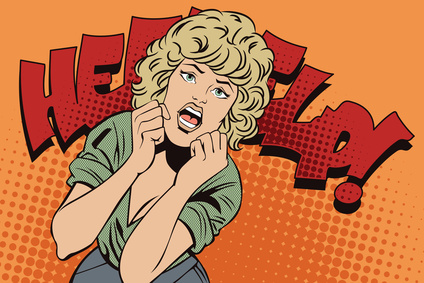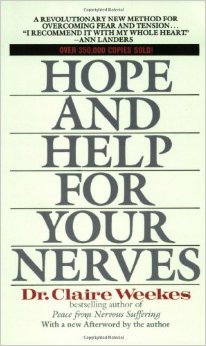Panic is the body’s language for “Watch out, buster, danger ahead!” It’s useful if you’re headed down a dark alley where Jack the Ripper is having a smoke. It’s a bit more vague when it bursts out of the blue. From my experience, an unexpected panic attack is an alert that something’s going on in your life that isn’t so hot for your well-being.
For me, it was a case of being overwhelmed, stressed out, and overextending myself.
Last Tuesday, it was a rainy and windy night. Wind in itself is somewhat overstimulating for us Vata types (that’s Ayurvedic Medicine-speak for people who are thin, light, cold, poor sleepers, and tend to get anxious). Add the plethora of challenges I had decided to take on…
the 14-day creativity summit
the seven-day plant-strong eating program
the 500-word-a-day writing challenge
the 130 e-newsletters and webinars cluttering up my inbox. (Did I say 130?) Yeah. This, following an all-day inventory project at work that had its share of snafus.
…it’s not surprising I had concocted the perfect recipe for panic.
So the universe decided to give me a wake-up jolt, which is what happens when I ignore my body’s signals to GIVE IT A REST, HOLCOMB.
Allow me to demonstrate how an outwardly calm and rational person can, on occasion, get hijacked by her emotions.
I whipped together dinner in a hurry, every muscle tense. I felt dizzy. My arms felt tingly. Before sitting down to shovel in my food, I decided to dig out the blood pressure monitor and take a reading. It was a tad high. Did I tell myself: That’s not surprising, you’re stressed, your blood pressure will go down when you calm down? No. I convinced myself that I was headed for a heart attack or stroke or worse: Kaiser. I convinced myself that I would have to ask my landlady to drive, and if I didn’t ask in a relaxed, oh-by-the-way manner, she would freak out and drive off without me.
So I decided to take another reading.
It was higher.
I took another.
Bad idea.
By then, I had shot into full-blown panic, body shaking, head buzzing, ears ringing. I knew I needed to calm down, but my mind was skittering around like a hamster on steroids in a maze.
How did I go from crazy hamster to zen water garden gal? From blood pressure that makes cartoon characters explode, back down to a mellow 110/80?
I used the tools in my “Chill, baby,” toolbox. When the first one didn’t work, I tried the next, and the next, and the next, until I found the right tool, or combination, that did the trick.
If you ever find yourself up the panic tree, here are eleven tips to help navigate your way down. Don’t give up. One of them is likely to work.
Prescription drugs: I headed straight for the Ativan bottle, something I take “as needed.” I had three pills left. I must have needed a lot lately. Hel-lo! I prayed that just one pill would work, and that I would survive the next thirty minutes before it kicked in.
Prayer: What the heck, it didn’t hurt to ask for help.
Movement: To work off the adrenaline, I shook my arms, gave my shoulders a roll, and paced back and forth, pausing periodically to check my blood pressure. A teensy-weensy voice inside my head shouted to stop checking. It may have been my doctor’s. I chose to ignore it.
Smile: I’d heard that smiling will convince the body all is lovely in the world. If I hadn’t been obsessively checking my blood pressure, I might have believed it.
Meditation: Yeah, right. If I had been taking my daily “meditation medication,” this could have done the trick. Alas, all those emails, those challenges, those webinars, took time I’d allotted for meditating. As I commented to a fellow blogging-buddy-reader-of-this-blog, there’s a Buddhist saying that goes something like: If you don’t have time to meditate for five minutes, you need to meditate for an hour.
Without that steady practice, it was hard to tap into my still, quiet place on command, especially when my heart was racing like an out-of-control roller coaster. Still, placing my hands in the position I take when meditating was somewhat calming.
Deep breathe: In for four, hold for seven, out for eight. Ten times. That usually works, but I still felt anxious. I switched to alternate nostril breathing. Ten times. That worked slightly better.
Distraction: It occurred to me that my mind was the culprit here. If I could distract it, my body would calm down. (Yes, even in the midst of a panic episode, there’s a rational part of me observing it all.) I counted down from ten over and over again. When I checked, my BP had gone down five points.
Soothing self-talk: I told myself, “I control my mind, it doesn’t control me. I’ve read the scientific evidence. We can change our brains.” My BP went down another five. But still higher than normal.
Music: I turned the radio on to a classical music station. Mozart, I remembered, is good for the brain. And by focusing on the music, I engaged my mind in something other than considering a trip to the morgue.
Visualization: I visualized myself in my safe place, lying on my blue picnic blanket on a field of grass under a sunny sky, hearing the ocean waves in the distance. This is another trick that works better if practiced in advance. Luckily, I had. I felt an immediate release of tension, as if an exorcist had pulled something immense from my chest. While I was at it, I visualized myself as confident and relaxed. And smiling.
HeartMath: Here’s a technique developed by Doc Childre, founder of the Institute of HeartMath®. Visualize people or animals you love, and focus on that love radiating from your heart. Feel a sense of gratitude while you’re at it. Here’s a link that describes the HeartMath solution, and techniques to help you manage your emotions.
I checked my blood pressure one final time. Score! It was in the mellow zone. One less challenge on my teetering plate.
Whew.
Next week, I’ll share what I learned from this impressive panic episode. Until then: chill, baby.



